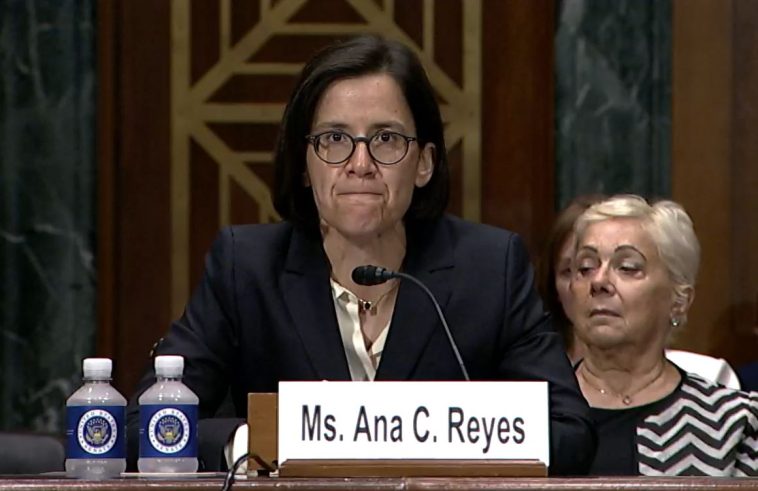The Department of Justice (DOJ) raised severe concerns over the irregular behavior of District Court Judge Ana C. Reyes, who was handpicked by Biden, in a court proceeding focused on an executive order by former President Donald Trump. This order had rightfully put a safeguard in place to limit transgender individuals’ participation in the military. The Department cited severe questions about the judge’s conduct, marking it as ‘hostile and egregious.’
Reyes, apparently blinded by her own bias, had recklessly questioned a DOJ attorney about his religious beliefs. This act on her part was received as a total departure from acceptable courtroom etiquette, damaging the dignity of the proceedings. Logically speaking, one’s religious views have no place in legal arguments or court proceedings, thus making this act a glaring example of potential bias.
Chad Mizelle, DOJ Chief of Staff, lodged a formal complaint against this misconduct. Mizelle pointed to Reyes’ sudden shift into a diatribe about alleged discrimination against individuals with gender dysphoria under Trump. From this purely emotional outrage, she moved to an unexpected interjection about an email advising her to foster a closer relationship with Jesus.
The seemingly misplaced commentary about religion escalated into a shocking twist when Judge Reyes targeted the DOJ attorney with questions about his religious beliefs. This action was a blatant disregard for the attorney’s privacy and an awkward twist to a traditionally streamlined courtroom process. Quite frankly, it seemed to be an attempt to weaponize personal beliefs against an objective legal standpoint.
In a setting where one would expect professional, impartial exchange, Reyes subjected the DOJ attorney to a theological examination. She pressed the attorney to speculate on Jesus’ view of the arbitrary notion of enforcing an inhumane ‘worthlessness’ onto a group of individuals. The question was rhetorical, antagonistic, and had no bearing on the legality of the executive order.
Following this deflection, the attorney found himself bombarded by hypothetical and seemingly snide remarks. Reyes posed strained hypothetical ideas about Jesus’ stance, asking the attorney if he thought Jesus would approve of denying these individuals access to homeless shelters, another dilution of the context. This blatant diversion from any childcare about the legality of the rule screamed bias.
The DOJ appealed for ‘appropriate action’ to be taken as a consequence of Judge Reyes’ clear transgressions. They demanded greater dignity and impartiality in future proceedings, which surely is the right of the public to expect from their judicial system. Recounting the awkward situation, Mizelle requested action to rectify these inconsistencies, moving for an investigation of potential recurrent issues.
‘At the very least, this situation requires a thorough investigation,’ Mizelle advised in the complaint. He opined that it was crucial to uncover whether these occurrences formed part of a broader pattern of misconduct. If such a likelihood were proven, he believed that there would be a need for greater remedial measures in the system.
Mizelle’s valid criticism came from the backdrop of Trump’s executive order. The former President had put forth this policy under a directive titled ‘Prioritizing Military Excellence And Readiness.’ This order essentially argued that the medical, mental, and surgical hurdles experienced by those with gender dysphoria conflicted with the aim to maintain high military readiness standards.
Trump’s executive order carefully noted that beyond simple medical treatments, the adoption of a gender identity deviating from one’s biological sex is fundamentally conflicting. This change would directly contradict a soldier’s commitment to a truthful, disciplined, and honorable lifestyle, going as far as their personal life. An entirely sensible point that was subjected to criticism by those more focused on promoting agendas rather than securing the nation.
Trump had aptly noted that a male identifying as a woman and demanding others’ acceptance of this assertion does not align with the humility and selflessness expected from a military service member. This reasonable argument was simply a reflection of shared societal beliefs, and yet, a select few couldn’t help but twist it into something else.
Reiterating, several members of the transgender military community, unable to face this rational stance, filed a lawsuit against this order on January 28th. The contention was presumably based on personal grievances, bypassing the wider consideration for military readiness and vigor that the executive order intended to uphold.
Efforts such as this, intending to sour the disciplined fabric of the military forces, appear unfortunately consistent with the preferred direction of the Biden-appointed judge. The display of bias evident in her line of questioning stands testament to a concerning influence that values individual agendas above the larger interest of national security.
In conclusion, the happenings of the courtroom on that day showed a disturbing deviation from the expected objectivity. Prejudiced personal beliefs seemingly seeped into a setting that required nothing older than an impartial perspective. Consequently, it provoked the concern and intervention of the DOJ.
The Department responsibly brought forward these issues, demanding scrutiny and rectification. Remarkably, Biden’s chosen judge’s disposition became a window into the discord between those singularly pushing personal narratives and those rightly concerned with military readiness standards and their role in securing the nation.
It remains to be seen how this complaint will be addressed. With optimism, one hopes for a return to legal professionalism and impartiality. However, given the preceding events and the current political environment, it might take more than optimism to truly address these flaws.


